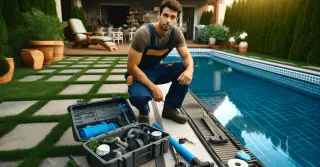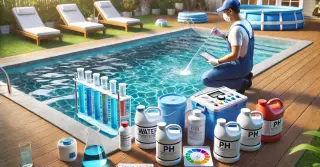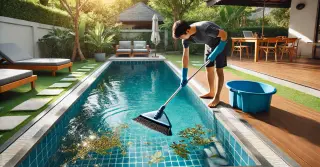Routine pool maintenance is essential for a clean, safe, and enjoyable pool. Failing to maintain your pool can result in algae growth, cloudy water, and equipment failures. By following a regular maintenance schedule, you can prevent these issues and keep your pool in top condition.
Essential Cleaning TasksKeeping your pool clean requires routine cleaning tasks. These tasks help eliminate debris, prevent algae, and maintain clear water.
- Skimming and Brushing: Regular skimming clears leaves, insects, and other debris from the water surface. This prevents debris from sinking to the bottom and causing further contamination. Brushing the pool surfaces eliminates dirt, algae, and buildup that can lead to stains and slippery areas. Routine skimming and brushing keep your pool looking pristine and prevent algae growth.
- Vacuuming: Cleaning the pool floor with a vacuum removes dirt and debris from the bottom. Automatic pool vacuums simplify this task, but manual vacuuming is sometimes needed for a deep clean. Regular vacuuming helps maintain water clarity and prevents debris buildup.
Balancing Pool ChemicalsMaintaining balanced pool water is crucial for safety and comfort. Proper chemical levels prevent algae growth, bacteria, and other contaminants, and protect the pool surfaces and equipment from damage.
- Water Testing and Adjustment: Consistently testing the pool water for chlorine, pH, alkalinity, and calcium hardness is crucial. Adjust the chemical levels as needed to keep the water balanced. Using a dependable test kit helps you accurately measure these levels, so you can make necessary adjustments.
- Shock Treatments: Shock treatments add a high dose of chlorine to the pool to destroy bacteria, algae, and other harmful substances. This is important after heavy use or significant weather events. Frequent shocking maintains water cleanliness and safety.
Maintaining Pool FiltersYour pool's filtration system is essential for maintaining clean water. Consistent filter maintenance keeps it running efficiently.
- Filter Cleaning: Based on your filter type—cartridge, sand, or diatomaceous earth—cleaning techniques vary. Cartridge filters must be removed and rinsed to clear dirt and debris. Sand and DE filters need backwashing to clean trapped particles. Regular filter cleaning ensures efficient operation and clear water.
- Changing Filter Media: Eventually, filter media will need replacement. For sand filters, the sand should be replaced every 3-5 years. Cartridge filters must be replaced every 1-2 years. DE filter grids should be replaced every 3-5 years. Consistently replacing filter media ensures optimal filtration and water quality.
Consistent pool upkeep is vital for maintaining a safe and pleasant swimming area. By implementing a regular maintenance plan, you can keep your pool in top shape for the long term.



